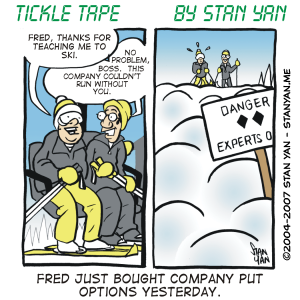Have you ever had a hard day and had to stop off at the grocery store to buy a loaf of bread and a gallon of milk? As you stand in the line that never seems to end, you glance at magazines, look at the candy stacked neatly in the back of you, and suddenly, while caught off guard, you load your cart up with candy, batteries, tabloids, and junk that you really don’t need. Merchants place those products at the checkout line on purpose. They know that many shoppers will make an impulse buy. Do you ever make an impulse buy when it comes to your stocks? Perhaps you see a provocative commercial for a product on television and unconsciously feel so good about the company that made the product that you buy its stock. Maybe while at your children’s school, you notice that all the kids are wearing a particular brand of shoes. Whatever it is, you may intuitively sense that a particular product is about to become the next big fad and that a rising stock price may soon follow. Your hunch may be right, but it’s vital that you maintain discipline and don’t make an impulse buy.
In his book, “Mind Over Money,” Harvard Medical School psychiatrist Dr. John Schott describes what he calls “The Impulsive Investor.” Impulsive investors are easily swayed by the image of a company. When they feel good about a company, they buy stock in it. For instance, they may like the stylish clothes they see at a retail chain and invest. Although their hunch may be right, they buy too quickly. Rather than carefully outline a trading plan, they go with their immediate first impression.
Sometimes these feelings are accurate, but in the long run, they tend to be wrong. According to Dr. Schott, the impulsive investor not only buys too quickly but sells too prematurely as well. It’s similar to “love at first sight.” An impulsive investor falls in love with a company, buys the stock, but sells when the initial infatuation ends. Dr. Schott argues, “because impulsiveness view stock personally and give themselves to the stock, they expect, in return, that the stock will reward them with quick gains. The underlying fantasy is ‘I’ve loved the stock, the stock must show that it loves me back by showering me with wealth.'” When the stock doesn’t fulfill the fantasy, the stock is sold.
Perhaps not all traders and investors show such an extreme unconscious dynamic process when trading their favorite stocks, but many traders and investors can form an unrealistic personal attachment to a stock. You may feel that traditional companies, like IBM or GM, are safe because you’ve followed these companies since you were a youngster. But from a purely logical standpoint, you know that the fundamentals of GM, for example, have not been strong recently. It is vital to separate your feelings toward a company from the objective facts about the company, whether they are fundamentals or current market sentiment that will ultimately drive the price.
Even if you aren’t an “impulsive investor,” as Dr. Schott describes, it’s useful to monitor those occasions when you are making a trade completely on impulse. Your feelings and intuition may be valuable guides for planning a trade, but they should be only one factor that influences your decision. Map out a clearly defined trading plan. Identify the factors that you expect to come into play in deciding whether to go long or short, and where to enter and exit. Dr. Schott suggests, “your goal is to restrain that impulsiveness by allowing for a period of investigation and reflection between your feelings and your actions.” Don’t impulse buy. Take a few moments to think things through. What seemed like a good idea at first glance may seem like a bad idea upon further consideration.


